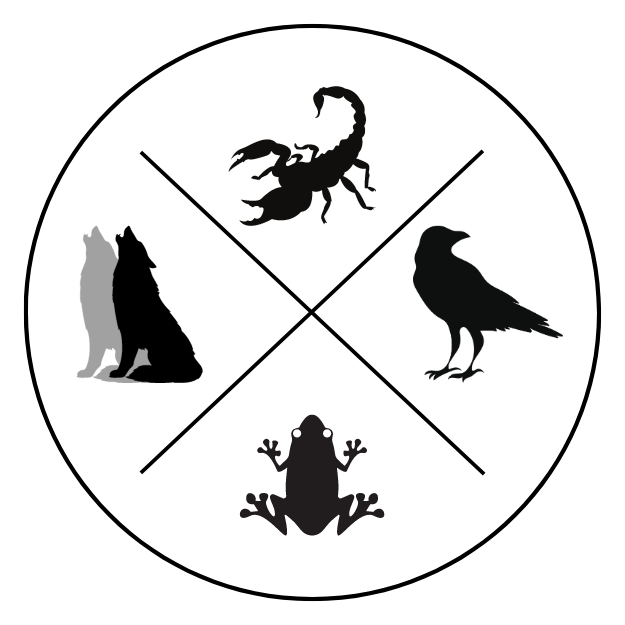Map of the Problematic
What to do when your heroes are horrible?


A while back I set up a podcast to listen to while I mowed the lawns. It was ostensibly about weightlifting, by an outfit called Starting Strength, hosted by a bloke called Mark Rippetoe. I'd seen stuff by Starting Strength before – I'd used their YouTube videos to learn how to deadlift and squat when my bad form threatened to mutilate my spine – and when it came to novice lifting programmes they seemed to know what they were talking about. [1] I was looking forward to learning more about strength, and lifting, and sports science in general. I put on my headphones and got to work. [2]
I was rounding a tricky bit out on the front verge by the fence, one of those bits where the grass grows out long from somewhere the mower can't quite get to. My frustration at this was compounded by a growing sense of confusion as the Texan drawls on the weight-lifting podcast turned their talk, for some reason, to solar power.
I wish I had examples of what I heard. Infuriatingly, I can't find the recording anywhere in my various internet or app histories, which is sad, because it was very funny. The gist was that solar power doesn't work. This perplexed me, because I have solar panels on my roof, and a battery next to my house. I can watch them work in real-time by turning the lights on. Of course, to give credit to Rippetoe and friends where probably none is due, he was talking about how solar power at scale doesn't work. Which is also wrong, but for different reasons. This talk inevitably segued into general riffing on climate change, and how it was a myth (feat. manly guffaws). All this was, for reasons that remain mysterious, presented as a metaphor for weightlifting.
I don't know a lot about lifting. Nor do I know much about climate change, in the scheme of things; I'm not a climate scientist. But I know a hell of a lot more about climate change than those yahoos. It was howler after canard, bullshit piled on bullshit so deep that it stopped being offensive and became riotous. I had to stop the podcast because muttering "that's not right," "well that's wrong," and "what the fuck?" under my breath — punctuated with occasional disbelieving yelps of laughter — was starting to attract looks from passers-by.
Mower parked for the moment, I did a bit more digging into Starting Strength's online oeuvre. Their "how to lift" videos seemed excellent, and in aggregate, were about twenty minutes long. Time well spent. Their novice lifting programs seemed, to my untrained eye, fine. There's plenty of stuff like interviews with strength coaches and athletes and the like, which I assume is also fine. The rest was dismaying. It was much less about strength and more a telling meander through the myriad pathologies of the modern American male mind. It's a grab bag of conspiracist nonsense: there's both climate denial (a recent episode features professional fossil fuel shill Alex Epstein opining about "the need for increased usage and accessibility of fossil fuels") and Covid-denial (Naomi Wolf and other cultural dingleberries receive guest spots).
So yeah. They're lunatics.
The implications are troubling. If I can't trust Starting Strength's ability to filter fact from fiction in their podcast, what am I meant to make of their fitness program? I don't expect perfection, or anything close to it, from my sources of information. Nor do I require uniformity of opinion or values. But this stuff was so egregiously wrong it was difficult to look past it. I suppose the real question is: why do people so reliably assume that their expertise in one domain — let's say, weightlifting — gives them the ability to comment on another, wildly different domain like climate science? [3]
The easy explanation is that weightlifters are meatheads, but I don't think that's it. [4]

Let's look at another telling example, someone who cannot be dismissed as a meathead. If you have spent any time at all in the online self-improvement space, you have run into Andrew Huberman. A scientist, a Stanford professor, a weightlifter and runner; chisel-jawed, muscle-bound, blue-eyed; this gleefully earnest podcaster and video-maker boasts subscribers in the millions. Huberman is — or at least appeared to be — one of those cases of nominative determinism so egregious that if he was a character in your draft novel or screenplay you'd get a strongly-worded email from an editor. "So this professor guy, he's good at everything? And extremely good-looking? Runs marathons, lifts heavy weights? And you put "Uberman" right in his name? Yeah, I'm going to need to get you to revise that draft." Huberman's style is simple, and instantly identifiable: his Huberman Lab show consists of really long recordings, sometimes with guests, often without, always with a camera on. He doesn't talk down to the audience, or at least, he affects not to; you feel like you're an undergrad in an introductory university science class being enlightened via bewilderment. Huberman endorses free, science-based "protocols" for a wide variety of things — eating, sleeping, exercise, fertility — as well as a dizzying array of supplements, beginning with the podcast staple Athletic Greens and multiplying from there. In addition to the red flags raised by supplement-hucking, recent revelations have both asked and answered questions about Huberman's character, as well as just how scientific many of his protocols and podcasts really are.
In short, the "lab" part of "Huberman Lab" is at best a stretch and at worst a fiction; his supplement regimen is spurious, some of his claims are implausible, others are bunk, and he was, until recently — there's no polite way to put this — boinking five different women. If the boinking had occurred in just one time and place I'd have no other comment apart from praising his stamina, but as it turns out, it was just boring old-fashioned non-consensual cheating. At least one of the women interviewed claims he gave her HPV; another says he was prone to outbursts of rage.
None of these things speak well of Huberman's character, and they're opposite to his image as a very cool and together guy, but I'm almost equally bothered by the revelations that he strayed almost as far out of his lane as the Starting Strength guys. It doesn't take much to start seeing this pattern repeat everywhere: well-meaning people begin opining on their area of expertise, which quickly grows to encompass everything. As well as sounding endless klaxons in my own head – I am swimming in the same sea with my little self-improvement newsletter – I'm struck by how difficult it is not just to produce accurate information but to consume it. How can we know what's true or helpful?
This is where I risk going wildly wrong myself, but here's how I try to manage it. As is eternally the case, your mileage may vary.
No gods, no heroes, no gurus
If you're looking for information, and a high-profile person is providing both helpful and unhelpful content, this is easier to parse if you haven't been worshipping at the altar of a cult of personality. Hopefully, you can take whatever useful stuff they've produced without feeling that you must either publicly defend or defenestrate them. The same applies for me, in the unlikely event that anyone feels like putting me on a pedestal. I often worry that my occasional ability to make England word good will result in people taking me too seriously. Try not to. This will not do wonders for my following or reputation as a producer of "content," as everyone in the space seems to thrive on delivering every word with the same total sense of self-assurance, but I think it very important that you take what I say with a nutritionally correct amount of salt. I try my best to get things right but I'm inevitably going to get stuff wrong. When I do, I'll try to correct it after the fact.
Domain expertise only
This might the most helpful way to map around the problematic. Here is an example: Is it 1976, and is Richard Dawkins talking about evolutionary biology? Then you should probably listen. Is he talking about trans people on Twitter in the 2020s? Good news, he's so far out of his domain that he may as well be a fish on the Moon. You can safely ignore his pronouncements on trans folk, and much else besides. Hooray!
It doesn't follow that expertise in one area can't apply to others. And there are methods of inquiry that can throw up insights across multiple domains. Done properly, journalism is one of them. (If it wasn't, I should probably stop writing this newsletter.) But if someone is being a dingbat in public then you've got a heuristic to hand: are they being a dingbat about their domain, or about something else? By way of example: Andrew Huberman is an ophthalmologist and a neuroscientist. In the event I find myself very interested in optic nerves, I will listen to him with reverence. The Starting Strength guys are very good at lifting weights. I'm happy to take their advice on my squat form, but I can safely leave their opinions on climate change in the trash where they belong.
Don't be Rick
I'm an sometime fan of the show Rick and Morty, which is a reluctant admission because have you looked at that show's fanbase? The premise, for anyone unfamiliar, is a kind of warped, multiversal Back to the Future in which Morty is a mostly inept teenage kid (and a bit of a piece of shit) and Rick is a autodidactic genius (and a complete piece of shit). The problem, as I see it, is that fans have not only taken "how to behave in real life" lessons from a cartoon, always a bad idea[5], but also that they've settled on being a know-it-all-asshole as a prerequisite to being an autodidactic genius. Needless to say, it's not — or, at least, it doesn't work that way around. There have been plenty of geniuses who were complete dicks in their personal lives, but their lesson should be that being an asshole is completely optional. Of course, being an asshole it doesn't necessarily diminish domain expertise. I'll happily accept drumming lessons from Ginger Baker or painting tips from Picasso, but I'm not going to take life advice from either.
How much information do you really need?
When you get interested in something, in self-improvement or any other field, it's natural to want more information. But how much of it is necessary to what you want to achieve? I'm not telling any budding neurosurgeons to throw out their textbooks, please don't do that, but in the self-improvement field a lot of information boils down to "do something quite simple very consistently for a long time." Starting Strength teaches you how to squat, deadlift, bench, and press. If you are most people, this is much of what you need to know for the first stages of your lifting journey. Yes, one size doesn't fit all, and I'm sure there are more optimal programs, but the fact remains that if someone who doesn't lift starts to do so regularly and safely they'll get stronger. [6] And that's all the information a beginner needs!
One might quibble this attitude when it comes to Andrew Huberman. His entire thing is providing the research and background that (sometimes!) backs up his protocols, and surely that's enough reason to listen. But let's look a little closer at the protocols themselves. They are often very simple, which is no bad thing. In fact, routines.club — a truly hideous website that appears to be almost entirely an artefact of AI built to SEO-huck the same supplements as Huberman — has conveniently summarised Huberman's daily routines, illustrated with physiologically implausible AI illustrations.

I'll go one step further and deconstruct AI Huberman's routine down to a bulleted list:
- Wake up at 6 am
- Drink 2 glasses of water + huck a supplement, also at 6 am
- Yoga Nidra meditation, also somehow at 6 am
- 6:45 am: sun exposure. I'm going to call this "going outside"
- 7 am: "cold exposure."
- 7:30 am: workout
- 10 am: coffee
- 1 pm: breakfast(!)
- 3 pm: more Yoga Nidra
- 6:30 pm: cardio
- 7 pm: food
- 9:30 pm: dims lights for quiet time
- 10:00 pm: reading
- 10:30 pm: zzzz
Apart from the intermittent fasting, there's nothing particularly controversial there. It's a well-ordered day, if a highly idealistic one (anyone with children, chores, or a normal job will be able to spot this instantly.) The one remaining Huberman oddity is his insistence on "delayed caffeine intake" to about 90 minutes after waking up to avoid a crash later in the day, which a recent literature review has all but debunked. There's certainly nothing that requires listening to hours of podcasts. Speaking of info-dumps: I'm going to suggest that Huberman's podcast-lectures are not actually that well-formatted for those with a casual interest in science. On multiple listens, his style starts to resemble a Gish Gallop, an unending cavalcade of information and citations in which it's very difficult for either scientists or laypeople to distinguish the science from the supplement sales pitch. (This podcast is brought to you by Mathletic Greens, the only balanced nutritional supplement that supports and enhances your maths skills). So not only is some proportion of the information suspect, it's surplus to requirements.
In fact, over my long history of trying and failing to be consistent with anything self-improvement, I've come to suspect that all the extra information gets in the way. We labour under the delusion that more information — or information delivered in a slightly different package — is what we need, when what we really require is the ability to stop overthinking, simplify the more-than-adequate information we already have, and put it into consistent practice.
If I ever figure that out, I'll let you know.
The weight-lifting program I (very imperfectly) use is essentially Casey Johnston's LIFTOFF, which – as far as I can tell – shares a bit with Starting Strength, including some newbie-friendly tweaks. If all of that means nothing to you, don't worry. I do recommend checking out Casey Johnston, though. She's great. ↩︎
Before anyone decides to point it out: You shouldn't really use noise-cancelling headphones as earmuffs. You should use earmuffs. But my mower is electric, and sounds more like a content swarm of bees than the usual deafening four-stroke roar, so I'm sure it's not doing me any harm. What? What's that? Sorry, I think some kind of bell that never stops ringing is calling me. ↩︎
Any neoliberal economists reading this can leave now, secure in the knowledge that your expertise is indeed applicable to every facet of life, as you've long suspected. ↩︎
And yet there's probably something to it. If I'd looked a bit closer at Mark Rippetoe's YouTube content before embarking on his podcast I might have come to the meathead conclusion a bit sooner and avoided the whole debacle: his omnipresent desk ornaments include a toy monkey and an oversized novelty mug with tits. ↩︎
When I was about eight I based an uncomfortably large part of my personality on Garfield comics. The autism is more and more obvious in retrospect. ↩︎
You also have to eat enough food with adequate protein, but that's another story that others are probably better equipped to tell. ↩︎





